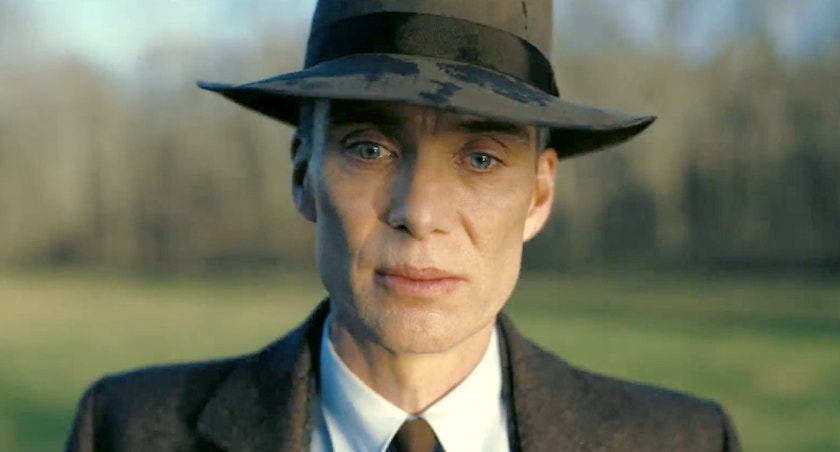Watch the review above or read it in full below!
–
I’m a big fan of Christopher Nolan. Even the filmmaker’s arguably “lesser” works, in my opinion, are still very strong films. It’s the Nolan scale, which, for me, goes from gobsmackingly incredible to… yeah, that was a pretty good film. Nolan’s latest, Oppenheimer, may not reach the heights of gobsmackingly incredible for me, but hey…
Nolan’s twelfth film as director is his second based on a true story; his previous real-life adaptation was 2017’s Dunkirk. He places the spotlight on J. Robert Oppenheimer (played by Cillian Murphy), the American theoretical physicist who played a key role in the development of the first nuclear weapon. It was a project known as The Manhattan Project – a history-making endeavour that was pushed by the U.S. government when it became clear that the Nazis also had a nuclear weapons program in the works. In 1945, the U.S. dropped two atomic bombs on the Japanese cities of Hiroshima and Nagasaki, killing between (as per varying reports) 129,000 and 226,000 people – mostly civilians.
As he has done before, Nolan uses a nonlinear timeline to explore Oppenheimer’s life and The Manhattan Project’s development. Seeing as it’s based on true historical events, there’s arguably less mystery here than most Nolan films – at least for those that are aware of the moments in history being depicted. But Nolan’s time jumping approach here, moving back and forth through history, introducing many characters and drip-feeding us elements of Oppenheimer’s elusive persona, it kept me firmly locked in – invested to see how all these sequences would end up crafting the tragic tapestry I could already envision.
However, while Nolan’s attention-grabbing direction did keep me glued to the screen, the info-bombardment and the montage-esque narrative approach kept me emotionally at bay for a surprising amount. Particularly in the film’s first third, Nolan moves quickly through moments in time, racing through character introductions and historical exposition to make us understand the scientific and political climate at the time. As great as it was to see the ridiculously talented ensemble chew up their scenes and have Nolan and his creatives flexing away to beef up mostly talky scenes, I did find myself wanting the film to slow down and take a breath. Yes, exposition and historical aspects are a major factor for this story, but can we ease up on the info overload to gather stronger emotional context for our characters – particularly Oppenheimer?


Another past critique directed to Nolan could be again applied here. The sound design – specifically, the score. The score by Ludwig Göransson (Tenet, Black Panther), which is admittedly fantastic, is relied upon perhaps too strongly and is simply blasted throughout. And as with Tenet, the sound design often becomes overbearing when it comes to the dialogue-heavy sequences. Wow, he definitely said something important… If I had only been able to hear it clearly.
I found there to be an unfortunate imbalance between historical beats and characterisation. Nolan has penned a sprawling, detail-heavy screenplay, but the individuals making up the story are a mismanaged bunch. The film depicts Oppenheimer as a fascinating figure – and I appreciated that Nolan wasn’t afraid to paint him as a flawed man. This isn’t exactly a boisterous, in-your-face individual. He’s a bit of an elusive character, with slight layers of complexity that call on us to study the performance closer. With Cillian Murphy, Nolan has the perfect actor to tackle this take on the man. With just a stare, Murphy speaks volumes, from fascination, to excitement, to heartbreak and regret. Nolan clearly knows the power of his actor’s eyes, training the camera on those emotive globes throughout the film. Murphy gives a magnetic performance.
Unfortunately, the two women in his life – Kitty Oppenheimer (Emily Blunt) and Jean Tatlock (Florence Pugh) – simply weren’t as fleshed out as I thought they needed to be. Yes, the film is about Oppenheimer, but these two individuals clearly played a large role in his life, and arguably helped shape some of his movements and decisions. With Kitty Oppenheimer suddenly playing a bit of a stronger part towards the latter stages of the film, it really pointed out, to me at least, that we needed further exploration of this relationship. A key family matter earlier, involving their parenting of their first child, spoke volumes – and it was barely touched on. Performance wise, both Blunt and Pugh are very good in their roles.
Strong performances all round from an insanely talented cast. While some serve as little more than big-name guest stars, there are standouts. Robert Downey Jr. reminds us that we really need him to be tackling more dramatic roles following his time at Marvel. With Lewis Strauss, Downey is given a strong supporting character, with a substantial arc, to flex those acting chops. Among the many smaller performances, of various sizes, I’ll also point to Alden Ehrenreich and Josh Hartnett among those that stood out to me.


Unsurprisingly, at this stage in Nolan’s career, Oppenheimer is a technical achievement. The visuals are simply beautiful and, when needed, strikingly nightmarish. Astonishing work from cinematographer Hoyte Van Hoytema, reuniting with Nolan following Interstellar, Dunkirk and Tenet. Nolan employs a number of fascinating techniques here, such as moving back and forth from colour to black and white to signify perspective changes. And as has been highly publicised, the film is boasting ultra, ultra, ultra large-format film photography, so yeah, the visual detail is incredible – although that really does rely on the screen you’re watching it on.
Also, don’t go into Oppenheimer with an expectation that you’ll be witnessing a bombardment of large-scale effects or real-world practical wizardry. Much has been said about how Nolan and his team tackled the Trinity Test itself. I won’t give anything away. Suffice it to say, while I thought it was an impressively mounted sequence, it’s impact owing a lot to sound design, I wouldn’t be surprised if some were left like… “That was it?”
It’s important to tell this story, to explore these periods in our history. The film looks at not only the breakthroughs made by these brilliant minds – their research fundamentally changed the world, but also delves into the politics intertwined with discovery and the human inclination for war. It is, sadly, incredibly timely. As the film began to wrap, much of what Nolan had to say about mankind’s ability and desire to both create and destroy, and how that seems to be the inevitability of our nature, really hit home for me. Seeing this film as a depiction of past horror and as a warning call for the nuclear threats of today, well… it’s Nolan’s most depressing film thus far – necessarily so.
So, while I don’t think that Oppenheimer is among Nolan’s best films, I still think it is a very good one, and one certainly worth watching.













